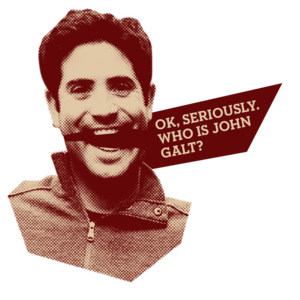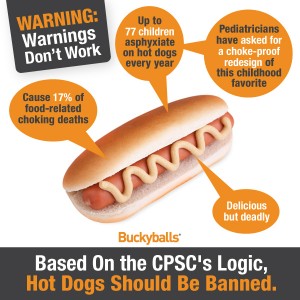- Dropping a legal cinderblock on his head: I’m quoted on CPSC’s aggressive legal action against former Buckyballs CEO Craig Zucker [Barbara Hollingsworth, CNS; NYT covers story; earlier here, etc.] Related, CPSC finally holds public hearing on magnet sets standard [WLF Legal Pulse].
- SCOTUS sleeper Bond v. U.S., on treaty power + toxic love triangle, no longer a sleeper as George Will devotes column to it [syndicated/WaPo, earlier]
- “The Ideological Migration of the Economics Laureates” [Daniel Klein et al, Econ Journal Watch via Tyler Cowen and Arnold Kling]
- Steven Teles’s diagnosis: “Kludgeocracy in America” [National Affairs; reactions from Brink Lindsey (“libertarianism serves as America’s superego while progressivism supplies the ego and id”), Ilya Somin, Nicholas Geiser/CEI “Open Market”]
- Farewell to Blawg Review’s “Ed.,” whose identity I never learned [Ron Coleman/Likelihood of Confusion, ABA Journal, Mark Bennett/Defending People; Overlawyered hosted Blawg Review #33 in 2005 and #220 in 2009; see also mentions and #56 at Point of Law]
- “Emotional linkbait”: police, press rush far ahead of evidence in many claims of bullying-induced suicide [Kelly McBride, Poynter]
- Wow: Columbia, S.C. interim police chief says he’ll come after advocates of pot law reform [Popehat]
Posts Tagged ‘Buckyballs’
BuckyBalls founder strikes back
 With a new “United We Ball” campaign against the Consumer Product Safety Commission (CPSC) and its Draconian enforcement action. Background here and here (& Scott Shackford, Reason).
With a new “United We Ball” campaign against the Consumer Product Safety Commission (CPSC) and its Draconian enforcement action. Background here and here (& Scott Shackford, Reason).
WSJ on Buckyballs: “the government wants to ruin the CEO who fought back.”
A couple of weeks ago I wrote about the very disturbing legal war being waged by the Consumer Product Safety Commission against Craig Zucker, CEO of a company that made Buckyballs, the adult magnetic-balls desk toy. After the CPSC decided to ban his product, Zucker fought back in the arena of public opinion, aiming satirical barbs at the commission and individual commissioners. CPSC then proceeded to pull him into the action personally as a party, seeking (on the basis of legal theories rarely if ever used in the past) to tag him with recall liability that the agency estimated at $57 million.
This weekend the Wall Street Journal came out with a big feature on the case, including an interview with Zucker by the Journal’s Sohrab Ahmari. Some highlights:
* At a time when sale of Buckyballs was still quite lawful pending adjudication, “and before Maxfield & Oberton [Zucker’s firm] had a chance to tell its side of the story,” the agency sent letters to major retailers asking that Buckyballs be pulled from shelves; most did, wishing to avoid trouble.
* The “responsible corporate officer” doctrine, which the CPSC cites as grounds for holding Zucker personally liable, has been very seldom invoked in the past, and the circumstances here (including the lack of reference to officer liability in the CPSC’s enabling statute) suggest that the Buckyballs case doesn’t fit. [More on that poor fit in this recent paper, previously linked in this space.]
* As for motives to go after Mr. Zucker, he provided a lot of them. During his attempt to fight the ban, his online “ads pointed out how, under the commission’s reasoning, everything from coconuts (‘tasty fruit or deadly sky ballistic?’) to stairways (‘are they really worth the risk?’) to hot dogs (‘delicious but deadly’) could be banned. Commission staff were challenged to debate Mr. Zucker, and consumers were invited to call Commissioner Inez Tenenbaum’s ‘psychic hotline’ to find out how it was that ‘the vote to sue our company was presented to the Commissioners on July 23rd, a day before our Corrective Action Plan was to be submitted.'” The thing is, you’d think, or hope, that the First Amendment to the Constitution would protect the right of a regulated party to talk back in this way, even disrespectfully.
Michigan-based commentator Bob Dorigo Jones, who has previously commented on the Buckyballs affair, wrote this on Facebook:
Buckyballs were a Godsend to our son, Johnny, last summer as he laid in a hospital bed recovering from a serious brain injury. He couldn’t watch TV or look at any type of screen because it hurt his eyes too much. He couldn’t read because it gave him headaches. But he could play with the Buckyballs that we purchased at the HOSPITAL gift store. They made a long stay in the ICU much more tolerable. Ironically, the same week he was in the hospital, an overreaching government agency banned the sales of Buckyballs — even to adults. Read this interview to get the full story on the Buckyballs saga. This is what happens when personal injury lawyers and their allies make the rules. We slowly lose our freedoms.
Read the WSJ piece here. More: Clark at Popehat, Gus Hurwitz at Truth on the Market, Alexander Cohen/Daily Caller.
August 29 roundup
- In-depth legal analysis of CPSC’s personal targeting of Buckyballs CEO, dangerous precedents it sets [Mark Chenoweth, WLF; paper by Sheila Millar and Kathryn Biszko of Keller and Heckman; earlier here, etc.]
- “She denies performing any ritual cleansing of gold coins, clearing of curses or consulting with Michael the Archangel” [Sun-Sentinel on fortune-teller prosecution]
- High moral ground? You must be kidding: U.S. Department of Justice, SPLC sue to keep poor kids in bad schools [Jason Bedrick and Andrew Coulson, Cato]
- At the intersection of business and religious liberty, Dahlia Lithwick sows confusion [Rick Garnett, Will Baude]
- Why infusing behavioral economics into regulation is likely to prove problematic [Christopher Koopman and Nita Ghei, Mercatus]
- Two views of ENDA [Hans Bader/CEI Open Market, Ken at Popehat]
- Disability Claimant Busted After Appearing on “The Price Is Right” [Lowering the Bar] Does Puerto Rico have an epidemic of mood disorders, or of intended SSDI eligibility? [Tad DeHaven, Cato]
“Childproofing The World: How Much is Too Much?”
I joined Scott Wolfson, communications director at the Consumer Product Safety Commission, as a guest on Angie Coiro’s “In Deep” radio show to discuss the Buckyballs case and safety regulation generally. Earlier in the same segment was ZenMagnets.com founder Shihan Qu, who is also battling the CPSC on the desk magnet issue. You can listen here. My coverage of the Buckyballs controversy is here and we also discussed a number of other noteworthy controversies including state attorneys general’s efforts to shut down the “Prescription: Coffee” mug and the status of dangerous consumer items home-produced by way of 3-D printers. CPSC Commissioner Nancy Nord’s statement on the magnet set issue is here.
CPSC sues defiant CEO individually in Buckyball case
A year ago, I wrote: “It’s rare for a regulated company to mount open and disrespectful resistance to a federal regulatory agency, but that’s what the maker of BuckyBalls, the popular desktop magnetic toy, is doing in response to the Consumer Product Safety Commission’s effort to ban its product.” The maker in question had devised cheeky, sarcastic ads asking why other products with injurious potential (coconuts, hot dogs) weren’t banned on the CPSC’s logic.
One reason it’s rare to mount open and disrespectful resistance to a federal agency is that agencies have so many ways to make businesspeople’s lives unhappy. This spring, breaking new legal ground, the CPSC reached out and named CEO Craig Zucker personally as a respondent in its recall proceeding. According to a Gibson Dunn commentary,
For the first time, the CPSC is pursuing individual and personal liability against an executive for a company’s alleged violations of the Consumer Product Safety Act. Although it remains to be seen whether the CPSC will adopt this approach in other cases, at minimum, this demonstrates just how far the CPSC is willing to push the envelope.
It’s just the latest example, the law firm says, of a pattern in which “the CPSC has aggressively enforced its governing statute and regulations, repeatedly pushing the limits of its expanded authority.”
As Morrison & Foerster says in its client alert:
Despite [Buckyballs maker] Maxfield and Oberton’s aggressive publicity campaign against the CPSC, the CPSC continued to pursue its complaint. Maxfield and Oberton folded and the company dissolved in December 2012, making the complaint moot. In February 2013, the CPSC moved for leave to file a second amended complaint naming the former CEO, Craig Zucker, both individually and as an officer of Maxfield and Oberton. The CPSC requested the same relief against Zucker as it had against Maxfield and Oberton—i.e., recall, refund, and compliance reports.
While Zucker has “argued that he could not be liable as he did not personally manufacture, distribute, or sell the product at issue,” CPSC has invoked something called the responsible corporate officer doctrine, approved by the Supreme Court in U.S. v. Dotterweich (1943) and U.S. v. Park (1975), which “permits responsible corporate officers to be held liable for the actions of the corporation, even in the absence of personal guilt on the part of the individual.”
Especially when the individual has helped promote Internet memes making fun of the CPSC.
P.S. Zen Magnets LLC of Denver, which markets a similar product which it says has not been linked to injury reports, and which has refused to withdraw its product from the market despite CPSC’s demands, is calling attention to a poll that it says shows the U.S. public overwhelmingly in favor of leaving recreational rare earth magnets on the market labeled for adult use (& Brian Doherty, Reason, Joe Patrice/Above the Law, Alexander Cohen/Atlas; cross-posted in slightly different form at Cato at Liberty).
P.P.S. Noted at the Cato version: “If the move succeeds, Zucker could be ordered to foot the bill personally for offering consumers full refunds for all products sold, reimbursing retailers for recall costs, and various other expenses potentially reaching into the millions.”
Safety roundup
- Patrick Basham on proposal to license smokers [Philadelphia Inquirer/Cato, earlier] New study confirms that rather than externalizing costs to the public treasury, smokers tend to cost social insurance programs less than nonsmokers do [Daniel Fisher, Forbes]
- Public health busybodies call on UK government to set minimum price for alcoholic drinks [Telegraph] Carrie Nation never thought of this: anti-booze campaigners target its calorie count [Baylen Linnekin] New York state plans anti-alcohol campaign [NY Post]
- “Will Litigation over Playground Injuries Create a Generation of Neurotics?” [WSJ via ABA Journal]
- Massachusetts Gov. Deval Patrick reassigns his exceedingly accident-prone state highway director [Boston Globe, Ilya Somin]
- “Magnet spheres may soon be harder to acquire than ammunition in the U.S.” as Buckyballs gives up [Anthony Fisher/Reason, earlier] And from Twitter: “Those 0.0 deaths per year were not in vain.” [@TPCarney modifying @bigtimcavanaugh]
- “Mary Cain wants $3000 damages from the street car company for a ‘sudden jerk.’ MO1917” [@tweetsofold]
- “No Liquid Soap Allowed in Pre-School Bathroom: Children Might Drink It” [Free-Range Kids]
And finally, the catchy, unsettling safety promotion video that’s been everywhere the last week or two, from the Melbourne transit authority:
Buckyballs maker gives up
“Oh Buckyballs, my Buckyballs. The addictive magnetic desk toy succumbs to government pressure and resigns itself to life as a cherished relic of the past.” [Amanda Kooser, CNet] Earlier on the manufacturer’s war with the Consumer Product Safety Commission (CPSC) here, here, etc.
The Buckyball resistance

A small company goes right on defying the Consumer Product Safety Commission: I’ve got more at Cato at Liberty (& see Nick Farr, Abnormal Use).
“Buckyballs vs. the CPSC”
The maker of the popular rare earth magnetic adult toy is defiant, and Reason.tv has a video [earlier here, here, and here]. “We’re the first company in 11 years that has said no to the Consumer Product Safety Commission.”
